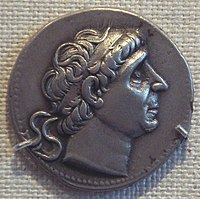Antiochus I.
Antiochus I Soter ( Greek : Ἀντίοχος Σωτήρ; * 324 BC ; † 261 BC ) was from 281 BC. King of the Seleucid Empire . He was a son of Seleucus I , a companion of Alexander the Great , and the Persian princess Apame .
Antiochus and his father were involved in the fighting between the Diadochi , the successors of Alexander the Great. He fought in 301 BC. As commander of the cavalry in the victorious battle of Ipsos against Antigonos Monophthalmos and Demetrios Poliorketes . Since 294 BC As co-regent of his father, he was entrusted with rule over the countries on the other side of the Euphrates . Allegedly Antiochus fell in love with his stepmother Stratonike I and fell into a lovesickness . Out of pity, his father gave him the woman whom he had in 293 BC. Married.
After his father was murdered in 281 BC. BC Antiochus was in the possession of the entire Seleucid Empire. Because of unrest in Asia he made peace with his father's murderer, Ptolemy Keraunos , and left Macedonia to him. A submission of Nicomedes I of Bithynia failed because he allied himself with Antigonus II Gonatas . Antiochus was 278 BC BC forced to make a peace with him in order to counter the threat from Ptolemy II of Egypt . He claimed the province of Koilesyria , marched on the news of Seleucus' death in Syria and conquered 280 BC. Chr. Damascus . The rule of the Seleucids over Asia Minor was at the same time endangered by the onslaught of the Celts , which began in 279 BC BC flowed across the Danube to Greece and Asia. Antiochus made peace with Ptolemy II and went to meet the Celts. A decisive victory in the so-called Elephant Battle over the Celts in 275 BC. Their further advance in Asia could be stopped and their settling in Galatia (today's Anatolia) achieved. In memory of this victory, Antiochus took the nickname Soter ("Savior", "Redeemer").
In contrast, he suffered losses in the first Syrian war (274-271 BC) against Ptolemy II, especially on the coast of Asia Minor, Cilician and Phoenician. In the year 262/261 BC BC he lost a decisive battle against the revolting Eumenes I at Sardis , whereby Pergamon and with it western Asia Minor were lost to the Seleucids. Antiochus died shortly afterwards.
His children from his marriage to Stratonike were:
- Seleucus († 267 BC executed)
- Antiochus II. († 246 BC)
- Apame († after 249/248 BC), ∞ with King Magas of Cyrene
- Stratonike († murdered by Seleucus II around 235 BC), ∞ with King Demetrios II of Macedonia
literature
- Ulrich Wilcken : Antiochus 21 . In: Paulys Realencyclopadie der classischen Antiquity Science (RE). Volume I, 2, Stuttgart 1894, Col. 2450-2455.
Individual evidence
| predecessor | Office | successor |
|---|---|---|
| Seleucus I. |
King of the Seleucid Empire 281–261 BC Chr. |
Antiochus II |
| personal data | |
|---|---|
| SURNAME | Antiochus I. |
| ALTERNATIVE NAMES | Antiochus I. Soter |
| BRIEF DESCRIPTION | King of the Seleucid Empire |
| DATE OF BIRTH | 324 BC Chr. |
| DATE OF DEATH | 261 BC Chr. |
